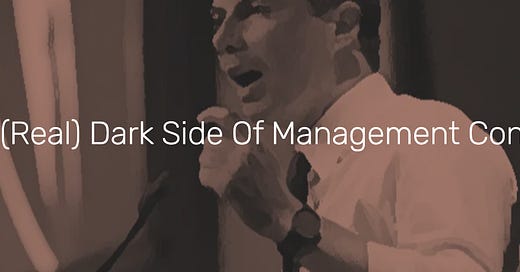November 28th, 2020 - Greetings from Puerto Escondido. I was able to find some Turkey down here and celebrated Thanksgiving with some friends. Hope everyone had a safe holiday wherever you find yourself right now.
Want to become a course creator? If you’ve been thinking about experimenting with creating online, I recommend checking out Teachable or Podia. You get a discount and I get 30% of the monthly price you pay.
Learn consulting skills: I also made all my Think Like A Strategy Consultant courses include lifetime access. I don’t offer discounts, but do offer a gift option for people that don’t have high incomes. Check that out here.#1 Thinking For Yourself & Curiosity
Paul Graham published an essay this week which contemplates the implications of where one might land on the conventional-thinking to independent-thinking spectrum and how that might play out for how to think about living life.
He identifies three traits of “independent-thinkers”
It seems to me that it has three components: fastidiousness about truth, resistance to being told what to think, and curiosity.
The most interesting part was about curiosity:
Is there a way to cultivate curiosity? To start with, you want to avoid situations that suppress it. How much does the work you're currently doing engage your curiosity? If the answer is "not much," maybe you should change something.
The most important active step you can take to cultivate your curiosity is probably to seek out the topics that engage it. Few adults are equally curious about everything, and it doesn't seem as if you can choose which topics interest you. So it's up to you to find them. Or invent them, if necessary.
That first part is vital and often underappreciated. How much does your job undermine a latent curiosity? I am often surprised at how many people’s hobbies re-emerge when they take a break from work or move to a job that is less taxing mentally.
For me, about seven months after I went solo my curiosity started to emerge in a powerful way. The whole game for me has been to think about how I can keep that energy alive by always thinking about the environments and type of work I’m involved in.
#2 Zoomers
Mark Allan Bovair had a nice article on his experience being a parent of “zoomers” during the pandemic and how he is thinking about the future
When we were in high school the talk was about good grades, Friday night football, and which college we were going to attend. It was always about preparing for the “next step.” There was a familiar rhythm to it. Some kids went to good colleges, some to local commuter schools, and others went straight to work in trades and labor.
Now high schoolers swap YouTube channels and talk about income streams, bitcoin, and Among Us. They hardly give a thought to race or religion; those are debates from another generation. They would likely be laughing at us, but there is a palpable nervousness as they come of age without a clear “next step” to guide them.
👉 Find the full article here
#3 Consulting Shenanigans
McKinsey is in the news again on the other side of attacks from the New York Times. It highlights a disturbing proposal:
In a 2017 presentation, according to the records, which were filed in court on behalf of multiple state attorneys general, McKinsey laid out several options to shore up sales. One was to give Purdue’s distributors a rebate for every OxyContin overdose attributable to pills they sold.
This is slightly misleading as consulting presentations often have many ideas including good, bad and crazy ones.
However, my criticism is that NYT doesn’t go deep enough. It seems they are too distracted by their beef with McKinsey (this seems obvious as BCG and other consulting firms never make their news) to get to the deeper issues.
Over the past fifty years, most jobs have become so specialized and disconnected from outcomes that many are unaware of the implications of their work. The people that are the best in today’s knowledge economy are the most analytically gifted, often ex-McKinsey and ex-Goldman Sachs type people. To succeed is to help your company make more money and boost its stock price. The imagination of what success looks like for many people working at big companies and consulting firm starts to narrow only to what can be measured.
Ethical and moral questions do arise, but they are quickly batted away when compared to these concrete numbers displayed on well-designed PowerPoint and Excel pages. In a tradeoff between a guaranteed profit and a grey area, the norm in our economy right now is to take the money.
The disturbing thing for me is not that McKinsey is involved with companies like Purdue. It’s that almost every company is playing these games and every day questionable moral and ethical decisions are on the agenda in corporate strategy groups across the globe. The payoffs, espeecially for those with stock-based compensation, are just too damn big to say no and we’re all complicit in this game.
Articles like this seem to enable many successful knowledge workers (myself included) to blame someone and to keep ignoring this reality.
I wrote about this in an essay published earlier this year titled The (REAL) Dark Side of Consulting in which I dive into the “subtle and deeper issues that are fundamentally not solvable and are the shadow side of the ultimate success of the industry.”
I highlighted four blind spots and argued that consulting firms have perfected this “stance” towards the economy and have enabled it to proliferate globally.
The third blind spot is a mindset I saw when working in consulting and the corporate world that helps explains why “good people” often end up doing things like opening fake accounts at Wells Fargo or pushing terrible meds at Purdue Pharama:
Blind Spot #3 An unchallenged belief in the idea of “impact,” which is an abstracted view of doing good measured by the number of people impacted, profit generated or an increase in shareholder value and only appearing in the positive sense that tends to seduce millions of people into the belief that they are “having an impact”
It’s easy to say “capitalism sucks!” but that fails to acknowledge that capitalism did not always operate this way and does not have to operate this way in the future. Capitalism has been successful because of the way it enables new behaviors and systems to emerge.
Let’s just remember that we are the ones that determine many of those behaviors. We don’t need to let the money or our desire for career success & approval from our loved ones dictate that we make shady decisions when we show up to the office (zoom meeting).
#4 The Genius Myth
Agnes Callard has a great essay on how we glorify geniuses and how it relates to The Queen’s Gambit (very good, would recommend):
The myth is of the genius “tortured” by some internal struggle the rest of us are not smart enough to understand, so that the best we can do is step out of their way. The real torture is the one we enact by classifying people as geniuses, to serve our own fantasies of independence. Geniuses are the monsters we make.
👉 The full essay is here:
Thanks for reading! As always, hit reply and let me know what you think. Let’s keep this “conversation” going.







Excellent post! Found you through your Twitter thread. Here are my takeaways from that combined with thoughts on your points:
1. Simple life, complex work (join big Tech/Finance firms that are too big to think and go home after 8 hours). Before and after, screw around, especially in content creation and nomad hubs
2. As a zoomer, we are angsty and looking for more.
3. Found it interesting that you used a painting of Buttigieg. Check out Colin Mayer's purpose-first versus stakeholder-first perspective (count externalities in profit).
4. That's simply because we don't recognize that smarts is part of powerful, and we let the powerful get away with too much. We have far more faith in geniuses than they have in themselves. The solution? Shared rules (no exceptions), which stabilize subjective answers and can cause acceptance above tolerance.